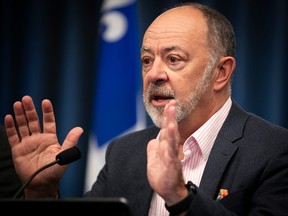Today, nearly 1.9 million Quebecers who are at least 20 years old do not have access to a family doctor.

Improvise and abdicate.
For some observers, those two words would best sum up the Coalition Avenir Québec government’s approach to health care since it was first elected eight years ago.
It was in September 2018 — a month before the provincial election that year — when François Legault made one of his key election promises: every patient in Quebec would be able to consult a family doctor or nurse practitioner “in less than 36 hours.” Yet if there is one promise the CAQ government has not been able to keep in its eight years in power, it would be that one.

Coincidentally, the Institut national d’excellence en santé et en services sociaux (INESSS) — which is supposed to be independent — issued a report last week recommending Quebec give vulnerable patients (those with chronic illnesses or severe health issues) priority access to family doctors over those with minor or routine needs.
But amid a groundswell of public outrage over the plan, Dubé backed off the idea on Thursday.
“Quebecers who have a family doctor will keep one. We want to reassure the public that we’re on the right track,” Dubé declared in a post on the X social media platform.
“As we committed to in the health plan, our objectives are very clear: We are doing everything we can to facilitate access and simplify the organization of front-line care for all Quebecers. Now, let the negotiations (with the FMOQ) take their course.”
So in what state do Quebecers find their health-care system in today?
- In addition to the lack of access to family doctors, the number of Quebecers waiting for a consultation with a medical specialist has soared to at least 870,000, from just over 500,000 in 2020.
- More than 467,000 Quebecers are now waiting past the medically acceptable delays for a wide range of medical issues, including for ear-nose-and-throat ailments to problems requiring assessments by specialists like dermatologists, urologists, gastroenterologists and orthopedic surgeons, among others.
- Nearly 27 per cent of emergency-room patients who are on stretchers languish on them in corridors for longer than 24 hours — a chilling statistic that has not budged in the past four years.
(The Health Ministry used to make public figures on wait times for surgery, but those stats are no longer available on its website.)
Rather than tackle these problems directly, Dubé has instead decided to create a parallel bureaucracy at a cost of $60 million. Santé Québec, headed by a non-clinician, Geneviève Biron (formerly of the family-run and private Biron Health Group), is expected to start running the province’s $60-billion-a-year health system in December.
Critics have charged Dubé is effectively abdicating his responsibility to Santé Québec, which some argue will centralize the management of health care to an excessive degree.
“This political tactic consists in strategically manipulating and using subordinates to achieve specific political or even personal objectives — getting re-elected, for example — while avoiding having to deal with the consequences of the policies implemented.”